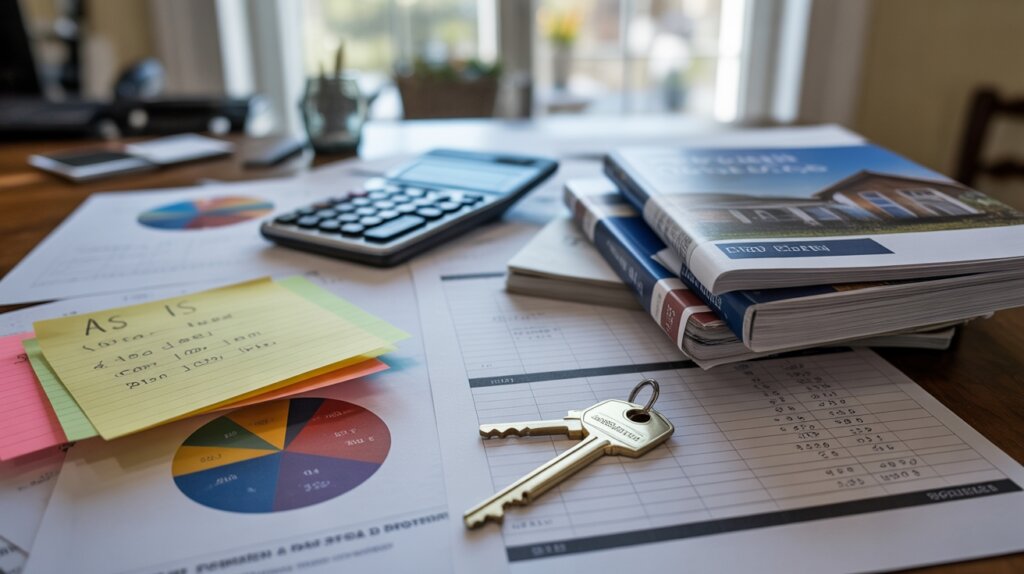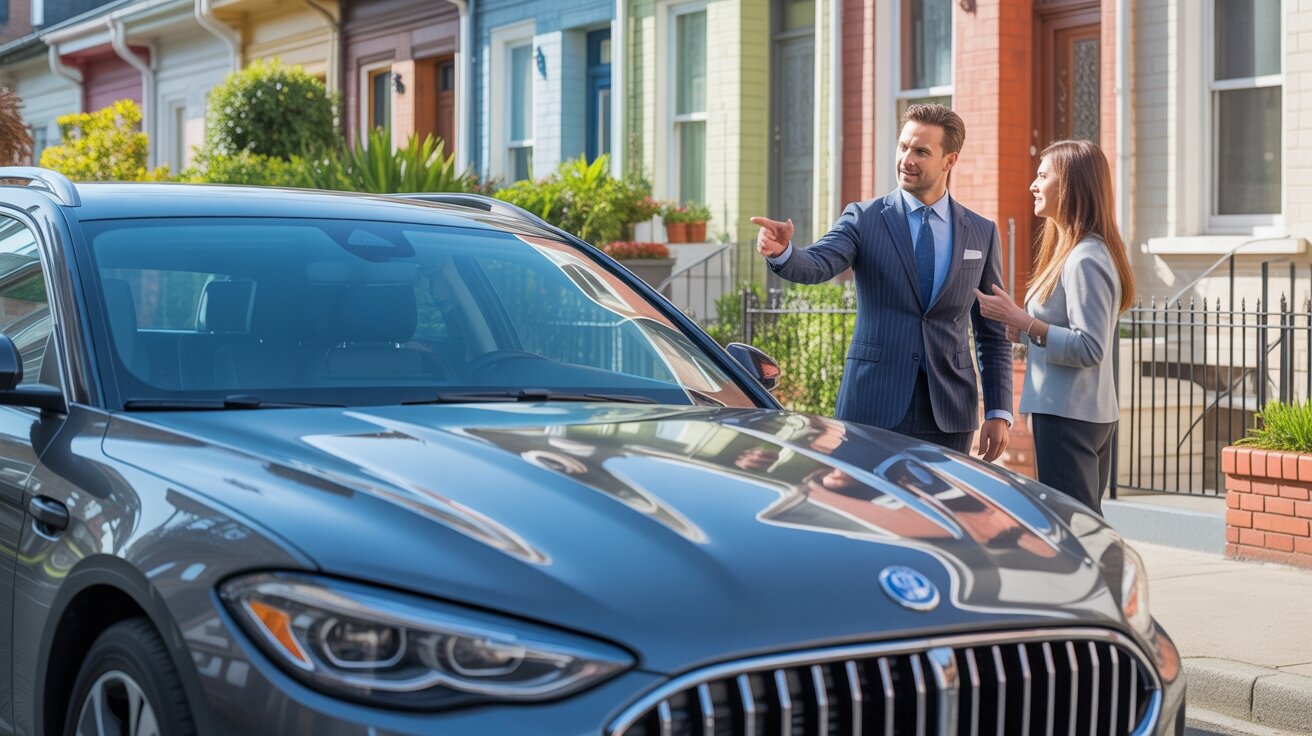Selling your house “as is” to cash home buyers can feel uncertain. You probably want to know the real numbers before making any decisions.
Most cash buyers pay between 30% to 70% of your home’s fair market value, though iBuyers may offer 90–100% minus service fees and repair costs. The exact amount depends on your property condition, local market, and the type of investor making the offer.
In this blog post, you’ll discover the formulas cash buyers use, typical offer ranges in different markets, and how to evaluate fair cash offers on your property.
Key Takeaways
- Cash home buyers typically pay 30% to 70% of market value for distressed properties
- iBuyers offer 90–100% of value but deduct 5–10% in service fees plus repair costs
- Fix-and-flip investors use the 70% rule: ARV x 70% minus repair costs
- No repairs needed when selling as-is, but offers reflect property condition
- Most cash for homes transactions close in 7–14 days without agent commissions
- Louisville’s median home price ranges from $293,900 to $339,500 as of July 2025
- Kentucky law requires a licensed attorney for deed preparation in home sales
What Percentage of Market Value Do Cash Home Buyers Typically Offer?

Cash home buyers generally offer between 30% and 70% of your property’s fair market value. The percentage varies based on who’s buying and your home’s condition. Direct home buyers need room to cover costs and make a profit.
Different buyer types have different pricing models. Investment property buyers calculate offers differently than large companies. Your location also affects the percentage you’ll receive.
Fix-and-flip investors
Fix-and-flip investors typically offer the lowest percentages among cash home buyers. They purchase homes to renovate and resell for profit. Their offers usually range from 30% to 70% of after-repair value.
These fixer-upper buyers follow the 70% rule strictly. They calculate maximum offers as ARV multiplied by 70% minus estimated repair costs. A Louisville home worth $293,900 after repairs might receive offers between $172,411 and $229,163 depending on needed fixes.
House flippers need significant profit margins to justify their risk. Kentucky flippers averaged $91,000 gross profit per flip in Q2 2024. Their business model requires buying well below market value to cover renovation costs and holding expenses.
iBuyers
iBuyers represent a different category of home buying companies that use technology to make instant offers. They typically pay 90–100% of current market value initially. This sounds attractive but comes with important deductions.
These companies subtract 5–10% in service fees from their offers. They also deduct estimated repair costs and closing expenses. A $293,900 home might get a $293,900 initial offer, but final proceeds could drop by $14,695 to $29,390 in fees alone.
iBuyers provide convenience through their quick home sale process. They handle paperwork and close in days. Their property assessment is usually automated through algorithms and brief inspections.
How Are Cash Offers for “As Is” Homes Calculated?
Real estate investors use specific formulas to determine what they can pay for your property. These calculations protect their investment while allowing reasonable profit margins. Selling house as is means accepting offers based on these investor math equations.
The calculation process starts with determining your home’s potential value after repairs. Investors then work backward, subtracting costs and desired profit. This systematic approach ensures property cash offers make financial sense for buyers.
After-Repair Value (ARV) x 70% – Repair Costs = Maximum Offer
The 70% rule forms the foundation of most investment property buyers’ offer calculations. ARV represents what your home would sell for in perfect condition. Investors multiply this by 70% to establish their ceiling price before repair deductions.
Here’s how the formula works in practice:
- Determine ARV through comparable sales analysis
- Multiply ARV by 0.70 to find maximum acquisition price
- Subtract estimated repair costs from that figure
- The result is the maximum cash offer percentage an investor can pay
A Louisville property with an ARV of $293,900 starts at $205,730 before repair deductions. Repairs costing $33,319 would bring the offer to $172,411. This protects investors while providing you a no-obligation offer that works within their business model.
The 70% factor covers multiple investor expenses beyond just profit. It accounts for holding costs, financing fees, taxes during renovation, and selling costs. Distressed property buyers face substantial risks that this cushion helps offset.
Service fees typically 5% to 10%
Home buyer companies that aren’t traditional flippers often charge service fees instead of using the 70% rule. These fees compensate them for their quick closing and convenience services. Sellers receive higher initial offers but pay fees at closing.
These service charges usually range from 5% to 10% of the purchase price. A $293,900 home would incur fees between $14,695 and $29,390. These companies also deduct repair costs from the final proceeds.
This fee structure differs from traditional realtor fees because you’re not listing the property. You trade a potentially higher sale price for speed and certainty. No real estate agent commissions apply, but service fees replace them partially.
What Factors Influence Cash Buyer Offers on Your Property?

Multiple variables affect what cash home buyers will pay for your specific property. Your home’s characteristics combine with market conditions to determine offer amounts. Direct home buyers evaluate each situation individually before making proposals.
Understanding these factors helps you set realistic expectations for property cash offers. Some elements you can control, while others depend on timing and location. All buyers consider these same basic criteria.
Local market conditions
Market value of as-is homes fluctuates based on your area’s real estate climate. Louisville’s current seller’s market gives property owners more negotiating power. Strong demand can push cash for homes offers higher than typical discount rates.
Cash sales accounted for roughly one-third of Louisville transactions in recent months. This high volume indicates active investor interest. Competition among home buyers near me can drive up what they’re willing to pay.
Median home prices in Louisville range from $293,900 to $339,500 as of July 2025. These values provide the baseline for all offer calculations. Local home buyers know neighborhood-specific trends that affect their bids.
Property condition
Your home’s physical state dramatically impacts fair cash offers you’ll receive. Distressed property buyers expect issues but adjust their offers accordingly. Major problems like foundation damage or roof failure significantly lower bids.
Cosmetic issues affect offers less than structural problems do. Fixer-upper buyers can handle outdated kitchens more easily than electrical system failures. They calculate repair costs precisely through their property inspection process.
Property depreciation from deferred maintenance compounds over time. Homes requiring no repairs needed for safety still sell as-is but command higher offers. Your honest disclosure helps buyers make accurate assessments.
Investor type
Different real estate investors serve different market segments with varying offer levels. House flippers need maximum profit margins and offer the lowest prices. iBuyers and we buy houses companies pay more but charge fees.
Local individual investors sometimes pay more than national companies. They know the neighborhoods intimately and can take calculated risks. Their offers might exceed formula-based bids from larger operations.
Selling to investors versus companies involves different trade-offs:
- Individual investors: potentially higher offers, slower process, more negotiation
- National companies: lower offers, fast closing, standardized procedures
- iBuyers: highest initial offers, significant fees, technology-driven process
Convenience for the seller
Your timeline needs influence what cash home buyers will offer. Buyers pay premiums for flexible closing dates that match their schedules. Quick house sales that accommodate buyer timing sometimes yield better offers.
Selling inherited property often involves motivated sellers with tight deadlines. Buyers recognize this urgency and may adjust offers accordingly. Your flexibility on possession dates can add value to your proposal.
No commission home sale transactions save you money even with lower offers. Traditional sales cost 5–6% in agent fees plus repairs and staging. Fast cash home sale options eliminate these expenses entirely.
Why Do Cash Home Buyers Pay Less Than Market Value?

Cash home buyers pay below fair market value because they assume risks and costs that traditional buyers don’t. They purchase properties in any condition without financing contingencies. Their business model requires profit margins to justify these risks.
Buyers must cover all repair costs out of pocket immediately after purchase. They also pay closing costs, holding costs, insurance, and taxes during renovation. Property cash offers must account for these expenses while leaving reasonable profit.
Real estate investors face market risk if property values decline during their holding period. They might spend months renovating only to face reduced sale prices. This uncertainty requires a protective discount at purchase.
Home buying companies provide valuable services that justify their cash buyer discount. They close in 7–14 days typically, freeing you from mortgage payments and maintenance. You avoid repair costs, staging expenses, and months of showings.
Selling distressed property through traditional methods often yields net proceeds similar to cash offers. Agent commissions, repairs, price reductions, and carrying costs add up quickly. We buy houses companies eliminate these variables entirely.
What Types of Cash Home Buyers Make “As Is” Offers?
Several categories of cash home buyers actively purchase properties without requiring repairs. Each type operates differently and appeals to different seller situations. Direct home buyers range from individual investors to large corporations.
Local individual investors form the largest group of distressed property buyers. They typically own 1–10 properties and focus on specific neighborhoods. These buyers often pay fair prices and close relatively quickly.
House flippers purchase, renovate, and resell properties for profit. They’re the most price-sensitive buyers because renovation costs directly impact their margins. Their offers follow the 70% rule closely.
National home buying companies like HomeVestors operate franchises across multiple states. They provide standardized processes and consistent closing timelines. Their brand recognition offers some sellers comfort despite lower offers.
iBuyer companies such as Opendoor and Offerpad use algorithms to generate instant offers. They target move-in-ready homes more than severely distressed properties. Their home buying services emphasize speed and convenience.
Real estate wholesalers contract properties and assign contracts to other investors. They rarely close on properties themselves. Their offers are typically the lowest since they need margin to resell the contract.
How Does the 70% Rule Work for Cash Home Sales?
The 70% rule provides investment property buyers a formula for maximum allowable offer amounts. This calculation protects their investment by ensuring adequate profit margins. Fixer-upper buyers across the country use this standard approach.
ARV represents your home’s value after all repairs in current market conditions. Investors research comparable sales of similar renovated homes nearby. This home valuation establishes the ceiling for their calculations.
Multiplying ARV by 70% creates the maximum purchase price before repair deductions. This 30% margin covers multiple costs:
- Renovation and repair expenses
- Closing costs on both purchase and resale
- Holding costs including utilities, insurance, and taxes
- Financing costs if they borrowed money
- Profit margin for their time and risk
Repair costs come directly off the 70% figure to determine actual offers. A property assessment by contractors provides these estimates. Major systems like roofing, HVAC, and foundation carry the highest cost impacts.
A Louisville example illustrates the formula clearly. An ARV of $293,900 multiplied by 70% equals $205,730. Repairs estimated at $33,319 reduce the offer to $172,411. This protects the investor while providing you certainty.
Some investors use 65% or 75% instead of 70% depending on market conditions. Louisville’s current seller’s market might push experienced investors toward 75%. Cash home buyer reviews often mention these percentage variations.
Is Selling “As Is” to OC Real Estate LLC Right for You?
OC Real Estate LLC specializes in purchasing homes in any condition throughout Louisville, Kentucky. We are cash home buyers who close quickly without requiring repairs or agent commissions. Our team provides fair cash offers based on current market conditions and your property’s unique characteristics.
We serve homeowners facing various situations including inherited properties, foreclosure, divorce, or simply wanting a fast closing. Our no-obligation offer process takes the pressure off your decision. You’ll receive a transparent breakdown of how we calculated our bid.
Our service areas include Louisville, Owensboro, Oldham County, La Grange, Crestwood, and Lexington along with other popular areas of Louisville, Kentucky. We handle all paperwork and work with licensed Kentucky attorneys as required by Kentucky Revised Statutes Chapter 382. Your home selling timeline can be as quick as 7 days or flexible to match your needs.
Contact OC Real Estate LLC today for your free property evaluation. We’ll provide a cash offer within 24 hours and close on your schedule. Our straightforward process eliminates the stress of traditional home selling while putting cash in your hands quickly.

